尊敬的用户您好,这是来自FT中文网的温馨提示:如您对更多FT中文网的内容感兴趣,请在苹果应用商店或谷歌应用市场搜索“FT中文网”,下载FT中文网的官方应用。
Mikhail Gorbachev, who has died aged 91, was the last leader of the Soviet Union and its first and last state president. Although he ruled in Moscow for less than seven years, the consequences of his tenure rewrote the global order at the end of the 20th century.
米哈伊尔•戈尔巴乔夫(Mikhail Gorbachev)去世,享年91岁。他是苏联最后一任领导人,是苏联第一任也是最后一任总统。尽管他在莫斯科的统治时间不到7年,但他的任期改写了20世纪末的全球秩序。
During his years in the Kremlin, from 1985 to 1991, he ended one-party communist rule in the Soviet Union, halted the global arms race and allowed the peaceful liberation of the states of central and eastern Europe. His policies terminated the “dictatorship of the proletariat” and ended the cold war but led to the collapse of the Soviet empire in the process.
1985年至1991年在克里姆林宫主政期间,戈尔巴乔夫结束了苏联的一党制共产主义统治,停止了全球军备竞赛,并允许中欧和东欧国家和平解放。他的政策终止了“无产阶级专政”,结束了冷战,但在此过程中导致了苏联帝国的解体。
Lauded in the west as a hero and awarded the Nobel Peace Prize in 1990, he was and still is condemned by many in Russia for wrecking its economy and putting paid to its superpower status. In reality, he attempted to reform a system that was in terminal decline, and thereby triggered a revolution that he could not control.
他在西方被誉为英雄,并在1990年被授予诺贝尔和平奖,但在过去和现在,许多俄罗斯人都谴责他破坏了俄罗斯的经济,使其超级大国地位不复存在。实际上,他试图改革一个已经走向末路的体制,进而引发了一场他无法控制的革命。
In contrast to his predecessors, Gorbachev was articulate and charismatic. He was also a brilliant tactician in the politics he knew best: manipulating the party. His instincts were democratic but his experience was bureaucratic. He was a pragmatist who could never quite bring himself to abandon his communist roots and throw in his lot with the most radical reformers. As a result, he ended up despised by diehard conservatives and liberal democrats alike.
与前几任领导人相比,戈尔巴乔夫能言善辩,魅力非凡。在他最熟悉的政治领域——操纵政党——他也是一位杰出的战术家。他的本能是民主的,但他的经验是官僚主义的。他是一个实用主义者,从来没有让自己完全放弃自己的共产主义根基,并与最激进的改革者们在一起。结果,他最终遭到了顽固保守派和自由民主派的鄙视。
Gorbachev was an outstanding student of the Soviet system — the first party leader to have attended university, followed by a stellar career through the party bureaucracy. Yet he eventually dismantled the totalitarian state created by Vladimir Lenin and Joseph Stalin. As he wrote in his autobiography in 1995, he was “a product of the nomenklatura [the party elite] and at the same time . . . its grave digger”.
戈尔巴乔夫是苏联体制的优秀学生——第一个上过大学的党的领导人,随后在党的官僚机构中取得了辉煌的事业。然而,他最终拆解了由弗拉基米尔•列宁和约瑟夫•斯大林创建的极权主义国家。正如他在1995年的自传中所写的那样,他是“权贵阶层(党内精英)的产物,同时也是......它的掘墓人”。
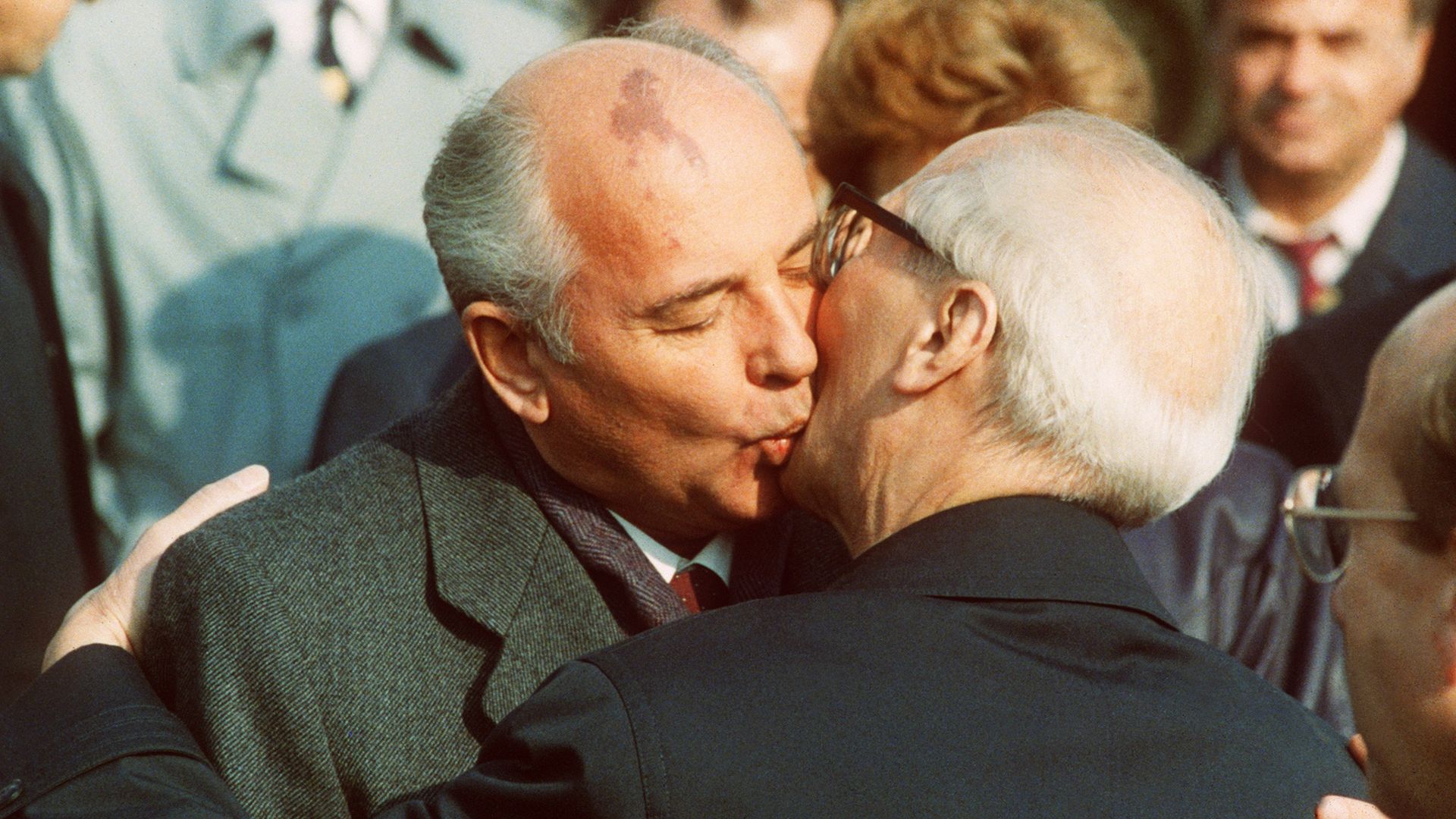

Unanimously elected as party general secretary in 1985 when aged just 54, he was the first relatively young and vigorous leader of a system ruled for decades by elderly men. Although his elevation was regarded with initial suspicion in Washington and other western capitals, it signalled the start of a “second Russian Revolution” that proved unstoppable.
1985年,年仅54岁的他被全票选举为苏共总书记,在这个由老年人统治了几十年的体制中,他是第一位相对年轻且充满活力的领导人。尽管华盛顿和其他西方政府最初对戈尔巴乔夫的提拔心存疑虑,但这标志着“第二次俄罗斯革命”的开始,事实证明这是势不可挡的。
Gorbachev embarked on what he called perestroika — restructuring. The slogan was chosen to sound unthreatening. The intention was to reform the communist system, to make it more efficient and humane. But given the stagnation throughout the economy and society, he knew it would require radical change.
戈尔巴乔夫开始了他所谓的“改革”——重组。选择这个口号是为了听起来不具威胁性。其目的是改革共产主义制度,使其更加高效和人性化。但鉴于整个经济和社会的停滞不前,他知道这需要彻底的变革。
On the eve of his election as party leader, he told his wife Raisa: “We can’t go on living like this.” Yet as each attempt to revitalise the economy was thwarted by an entrenched and corrupt bureaucracy, he switched to ever more fundamental political transformation that came to threaten the leading role of the Communist party itself.
在当选为党的领导人前夕,他对妻子赖莎说:“我们不能再这样生活下去了。”然而,由于每次振兴经济的尝试都被根深蒂固的腐败官僚机构所挫败,他转而进行更加根本性的政治变革,这对共产党自身的领导地位构成了威胁。
Gorbachev’s greatest successes were on the world stage, where he overcame deep mutual suspicion and forged close ties with Ronald Reagan, then US president, and his successor George HW Bush. After a 1984 meeting with Margaret Thatcher, she famously concluded: “I like Mr Gorbachev. I think we can do business together.”
戈尔巴乔夫最大的成就是在世界舞台上,他克服了深深的相互猜疑,与时任美国总统罗纳德•里根(Ronald Reagan)及其继任者老布什(George HW Bush)建立了密切的关系。1984年与玛格丽特•撒切尔(Margaret Thatcher)会晤后,她得出了一个著名的结论:“我喜欢戈尔巴乔夫先生。我想我们可以一起合作。”
In the west, his easy smile, intelligence and charm inspired “Gorbymania” from the crowds who mobbed him on his travels with the glamorous and intelligent Raisa in the 1980s. In Germany he was most popular of all, thanks to his role in backing unification after the fall of the Berlin Wall.
在西方,他轻松的微笑、智慧和魅力激发了“戈尔巴乔夫狂热”(Gorbymania)。上世纪80年代,当他和魅力四射、聪明伶俐的赖莎(Raisa)一起旅行时,人们簇拥着他。在德国,他是最受欢迎的,这要归功于他在柏林墙倒塌后支持统一的角色。
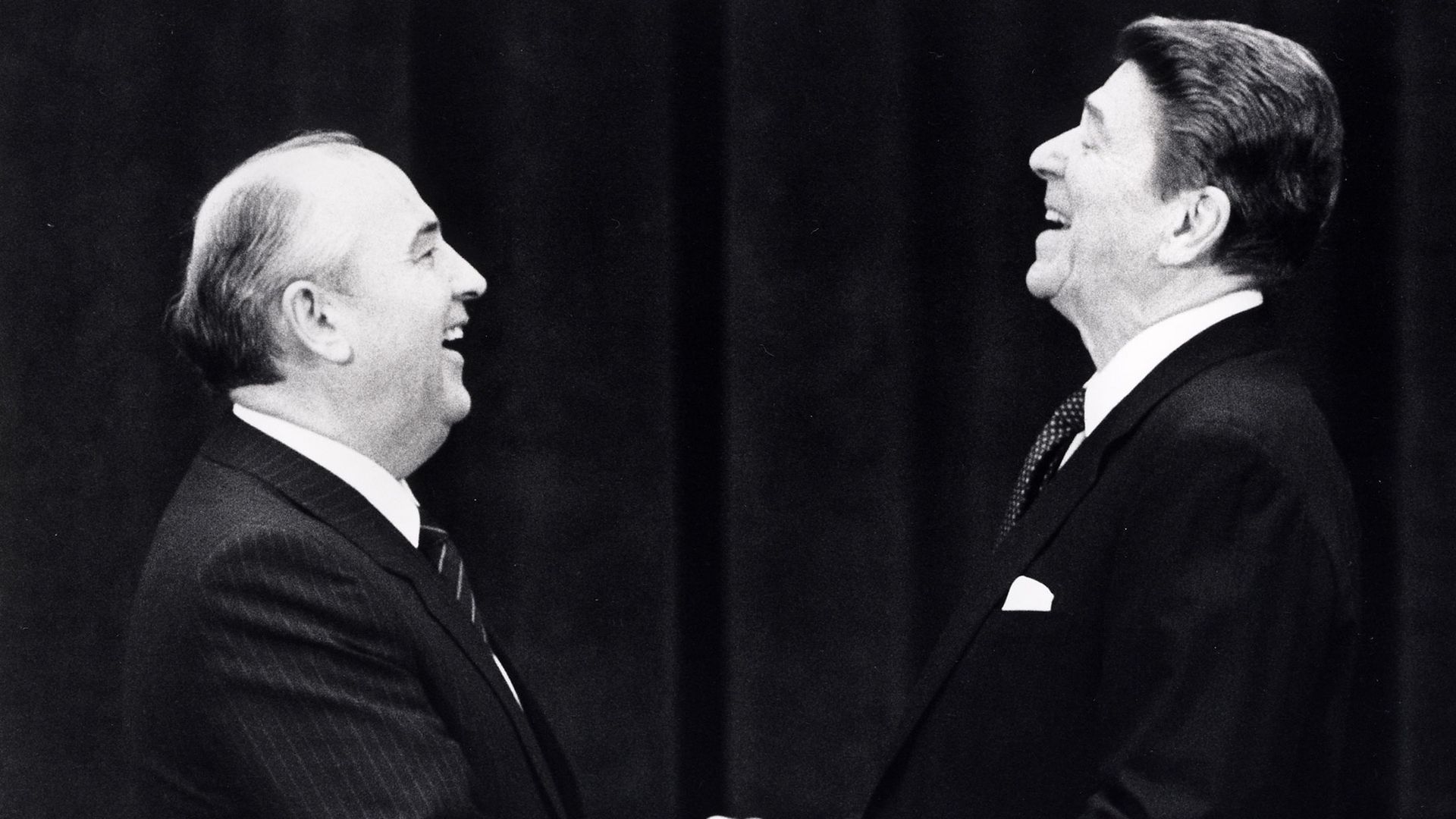

His “new thinking” was instrumental in ending the ideological confrontation between east and west. Seeing a direct link between ruinous military expenditure and the sorry state of the Soviet economy, he set out to end the global arms race. He promoted the idea of a nuclear weapons-free world by 2000 and pulled Soviet troops out of their disastrous intervention in Afghanistan.
他的“新思维”在结束东西方之间的意识形态对抗方面发挥了作用。看到破坏性的军事开支和苏联经济的糟糕状况之间的直接联系,他开始着手结束全球军备竞赛。他倡导在2000年之前建立一个无核武器世界的理念,并将苏联军队从其对阿富汗的灾难性干预中撤出。
In the USSR, however, his perestroika unleashed forces he could not control. His initial popularity, boosted by televised walkabouts and frank public debates, faded as his reforms failed to transform the domestic economy and improve ordinary lives. Perestroika sought to promote private initiative without dismantling the ossified state planning system or allowing a real market economy. The result was a collapse in state-controlled production and chaos in the distribution of goods.
然而,在苏联,他的改革释放了他无法控制的力量。他最初的受欢迎程度是通过电视转播的罢工和坦率的公众辩论而提高的,但随着他的改革未能转变国内经济并改善普通民众的生活,他的支持率逐渐下降。改革寻求在不废除僵化的国家计划体制或允许真正的市场经济的情况下促进私人的主动性。其结果是国家控制的生产的崩溃和商品分配的混乱。
Glasnost, or transparency, the other pillar of his transformation process, also had unintended consequences. It was supposed to be a carefully orchestrated opening of the media to expose the sins of the past and outmanoeuvre opponents of reform. By removing draconian restrictions on information, however, it resulted in a diversity of opinion and public debate that exposed the entire power structure to devastating criticism.
作为他转型过程的另一个支柱,公开性(Glasnost)或透明度(transparency)也产生了意想不到的后果。这应该是一场精心策划的媒体开放,以揭露过去的罪恶,并在策略上战胜改革的反对者。然而,通过取消对信息的严格限制,它导致了意见的多样化和公众辩论,使整个权力结构暴露在毁灭性的批评之下。
When he arranged in 1986 — behind the backs of the KGB secret police — to end the exile of Andrei Sakharov, father of the Soviet nuclear bomb, he liberated a man who rapidly became the moral conscience of the country. The most famous Soviet dissident wanted genuine democracy and an end to the “leading role” of the Communist party. In 1989, at the Congress of People’s Deputies, a grudging Gorbachev gave him the platform to say so. The nation stopped work to watch them argue on live TV and, from that moment, the revolution was unstoppable.
1986年,当他背着克格勃秘密警察安排结束苏联核弹之父安德烈•萨哈罗夫(Andrei Sakharov)的流亡时,他解放了一个迅速成为这个国家道德良知的人。这位最著名的苏联持不同政见者想要真正的民主和结束共产党的“领导地位”。1989年,在人民代表大会上,不情愿的戈尔巴乔夫给了他这样说的平台。整个国家停止工作,观看他们在电视直播中争论,从那一刻起,革命就势不可挡了。
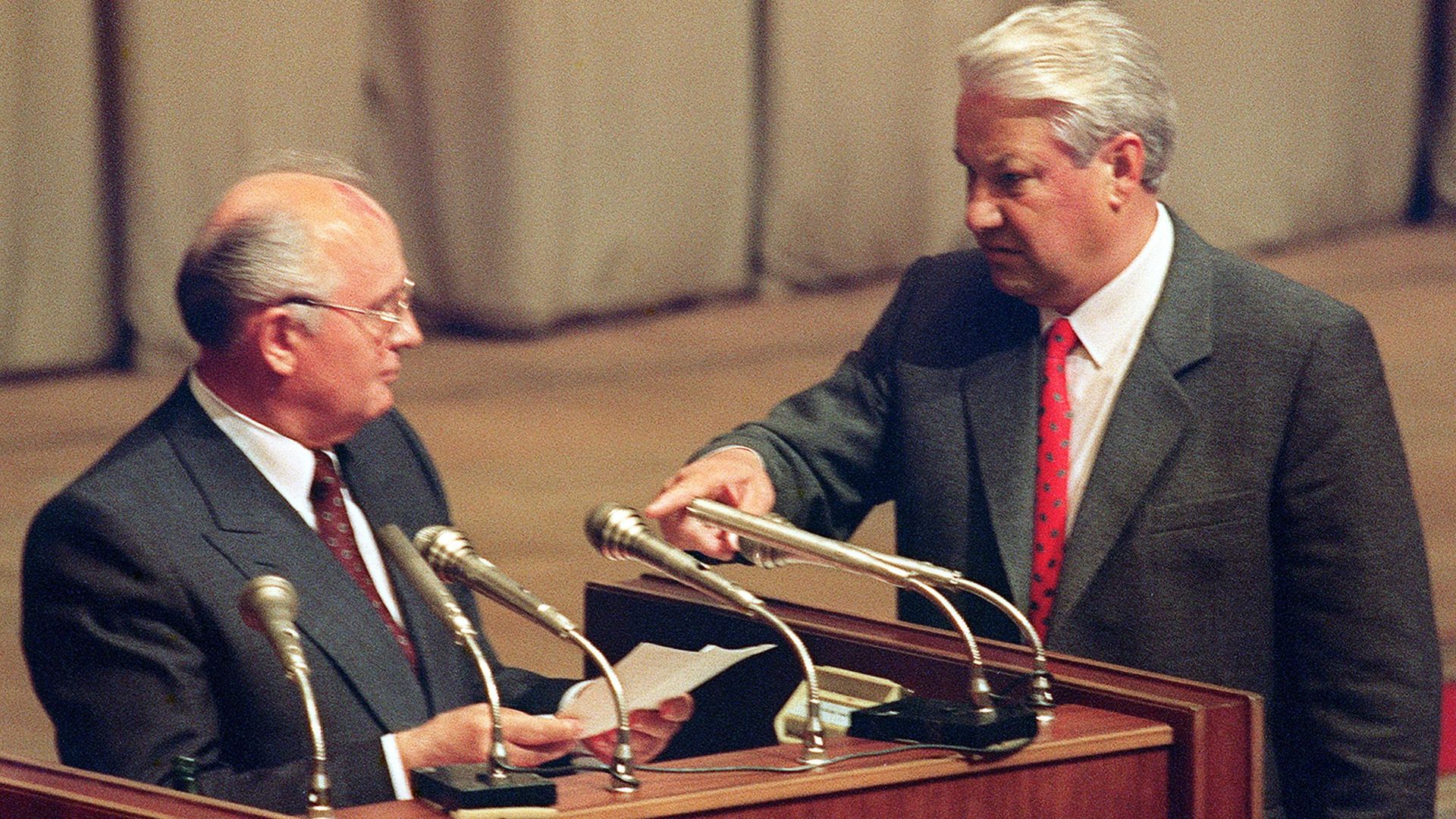

One of Gorbachev’s greatest failures, however, was in not dismantling, or at least emasculating, the KGB itself. At first he relied on the security service to drive the reform process, but in the end it became the leading force of reactionary opposition and led the coup attempt in 1991 that sought to overthrow him. Although the coup failed, the president’s inability to revive the moribund economy and contain an upsurge of nationalist revolts that spread from the Baltic republics to the Caucasus was what eventually destroyed the Soviet Union.
然而,戈尔巴乔夫最大的失败之一是没有解散克格勃,或者至少对其进行阉割。起初,他依靠安全部门来推动改革进程,但最终,安全部门成为反动反对派的主导力量,并在1991年领导了企图推翻他的政变。虽然政变失败了,但由于总统没能重振停滞不前的经济,也没能遏制从波罗的海共和国蔓延到高加索地区的民族主义叛乱,最终摧毁了苏联。
What started as demonstrations for devolution to outlying parts of the empire became outright independence movements, spreading in turn to Russia itself. Gorbachev never understood why there was so much resentment of Soviet rule but his democratic instinct meant he was not ready to suppress it. Without a ruthless tsar in the Kremlin, the centre could not hold.
一开始的示威游行要求将权力下放到帝国的外围地区,后来变成了彻底的独立运动,进而蔓延到俄罗斯本身。戈尔巴乔夫一直不明白为什么人们对苏联统治有如此多的怨恨,但他的民主本能意味着他还没有准备好镇压。如果克里姆林宫里没有一个冷酷无情的沙皇,那么这个中心就无法维持。
He also refused to intervene militarily to stop the overthrow of communist regimes in eastern Europe, espousing what Gennady Gerasimov, his spokesperson, famously described as the “Sinatra doctrine — they’ll do it their way”. He even gave his blessing to German reunification in 1990 against strong opposition from the security services. It was a sign of weakness for which the KGB, the military establishment, and communist loyalists never forgave him.
他还拒绝进行军事干预,以阻止东欧共产主义政权被推翻,而是信奉其发言人根纳季•格拉西莫夫(Gennady Gerasimov)著名的“辛纳屈主义——他们会按自己的方式行事”。1990年,他甚至不顾安全部门的强烈反对,为德国统一送上了祝福。这是一种软弱的表现,克格勃、军事机构和共产党的忠实信徒永远不会原谅他。


That was the year when Gorbachev was awarded the Nobel Prize for his “leading role in the peace process”. But already his authority in Moscow was fading fast. As the economy collapsed and demonstrators demanded independence on the streets of Tallinn, Vilnius and Tbilisi, he swung back to the conservatives in his party, attempting to reimpose Soviet authority. It was too late. The centre of power was moving inexorably to the Russian presidency by then held by his great rival, Boris Yeltsin.
那一年,戈尔巴乔夫因“在和平进程中发挥的主导作用”而被授予诺贝尔奖。但他在莫斯科的权威已经迅速衰落。随着经济崩溃,示威者在塔林、维尔纽斯和第比利斯的街头要求独立,他转而支持党内的保守派,试图重新树立苏联的权威。但为时已晚。权力中心不可阻挡地向他的劲敌鲍里斯•叶利钦的总统宝座转移。
The abortive three-day coup in August 1991 merely accelerated the process of disintegration. Gorbachev, briefly placed under house arrest in his holiday villa in Crimea, never recovered his full authority. The Communist party was banned and Yeltsin emerged as hero of the hour. The Soviet Union ceased to exist on December 25 and its last leader was bundled ignominiously into retirement.
1991年8月那场为期三天的未遂政变只是加速了解体的进程。被短暂软禁在克里米亚度假别墅里的戈尔巴乔夫,再也没有恢复其全部权力。共产党被取缔,叶利钦成为当时的英雄。苏联于12月25日不复存在,其最后一任领导人也不光彩地被迫退休。
Controversy over that imperial disintegration persists to this day. President Vladimir Putin, a former KGB colonel, is driven by the belief that the collapse of the Soviet Union was “the biggest geostrategic tragedy of the last century”.
关于帝国解体的争论一直持续到今天。前克格勃上校、俄罗斯现任总统弗拉基米尔•普京(Vladimir Putin)认为,苏联解体是“上世纪最大的地缘战略悲剧”。
Mikhail Sergeyevich Gorbachev was born on March 2 1931 into a peasant family in the village of Privolnoye, in the rolling wheat lands and sheep farms of the Stavropol region in southern Russia. His experience as a child under German occupation was important. “Our generation is the generation of wartime children. It has burned us, leaving its mark both on our characters and on our view of the world,” he wrote in his memoirs.
1931年3月2日,米哈伊尔•谢尔盖耶维奇•戈尔巴乔夫出生在俄罗斯南部斯塔夫罗波尔地区普里沃尔诺耶村的一个农民家庭,那里有连绵不断的麦田和羊场。他作为德国占领下的儿童的经历是很重要的。他在回忆录中写道:“我们这一代是战时儿童的一代。它灼伤了我们,在我们的性格和对世界的看法上都留下了痕迹。”
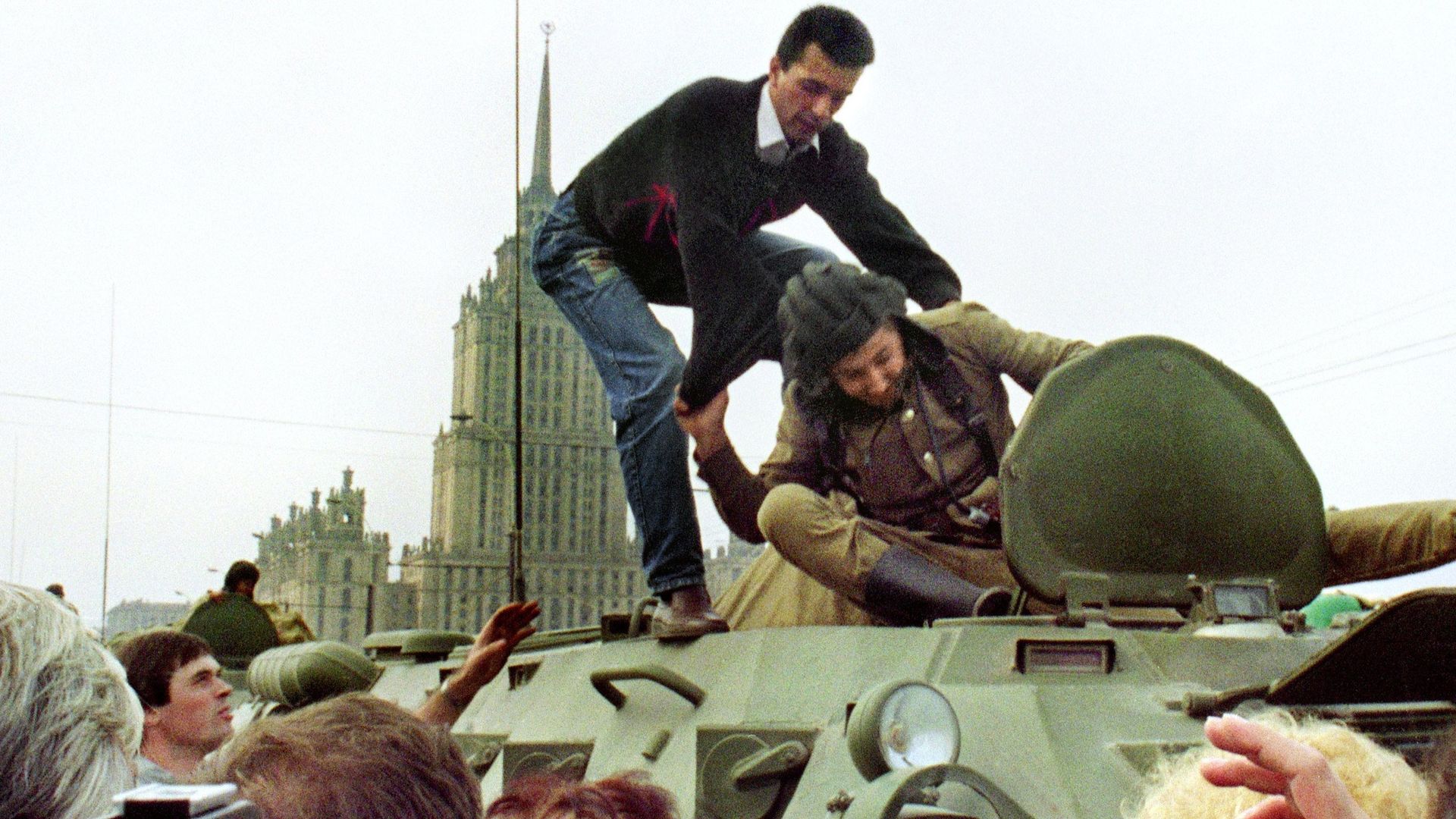

He never forgot the experience of stumbling across the rotting corpses of Red Army soldiers under the snow. “There they lay in the thick mud of the trenches and craters, unburied, staring at us out of black, gaping eye sockets.” It made him acutely aware of the futility of war and suspicious of the power of the military establishment.
他永远不会忘记在雪下偶然发现腐烂的红军士兵尸体的经历。“他们躺在战壕和弹坑的厚厚的泥土里,没有被掩埋,黑色空洞的眼窝盯着我们。”这使他敏锐地意识到战争的徒劳,并怀疑军事机构的权力。
Thanks to his family history, the future party leader was also conscious of the cruel and arbitrary treatment of dissent under Stalin. Both his grandfathers suffered persecution in the 1930s: one was exiled to Siberia, the other was imprisoned and interrogated by Stalin’s brutal NKVD security police, forerunners of the KGB, as a suspected Trotskyite.
由于他的家族史,这位未来的党领袖也意识到斯大林时期对异议者的残酷和武断的对待。他的祖父和外祖父都在20世纪30年代遭受了迫害:一位被流放到西伯利亚,另一位被斯大林残暴的内务人民委员会(NKVD)安全警察(克格勃的前身)关押和审讯,被怀疑是托派分子。
He still managed to be top of his class in school and went on to Moscow State University to study law in 1950. Later he admitted that he and his fellow students were subjected to “massive ideological brainwashing”. But he read voraciously, declaring that “the first authors who sowed the seeds of doubt” in his mind about the communist system were Marx, Engels and Lenin.
在学校,他仍然是班里的尖子生,并于1950年前往莫斯科国立大学学习法律。后来他承认,他和他的同学们受到了“大规模意识形态洗脑”。但他如饥如渴地阅读,宣称“在他心中对共产主义制度播下怀疑种子的第一批作者”是马克思、恩格斯和列宁。
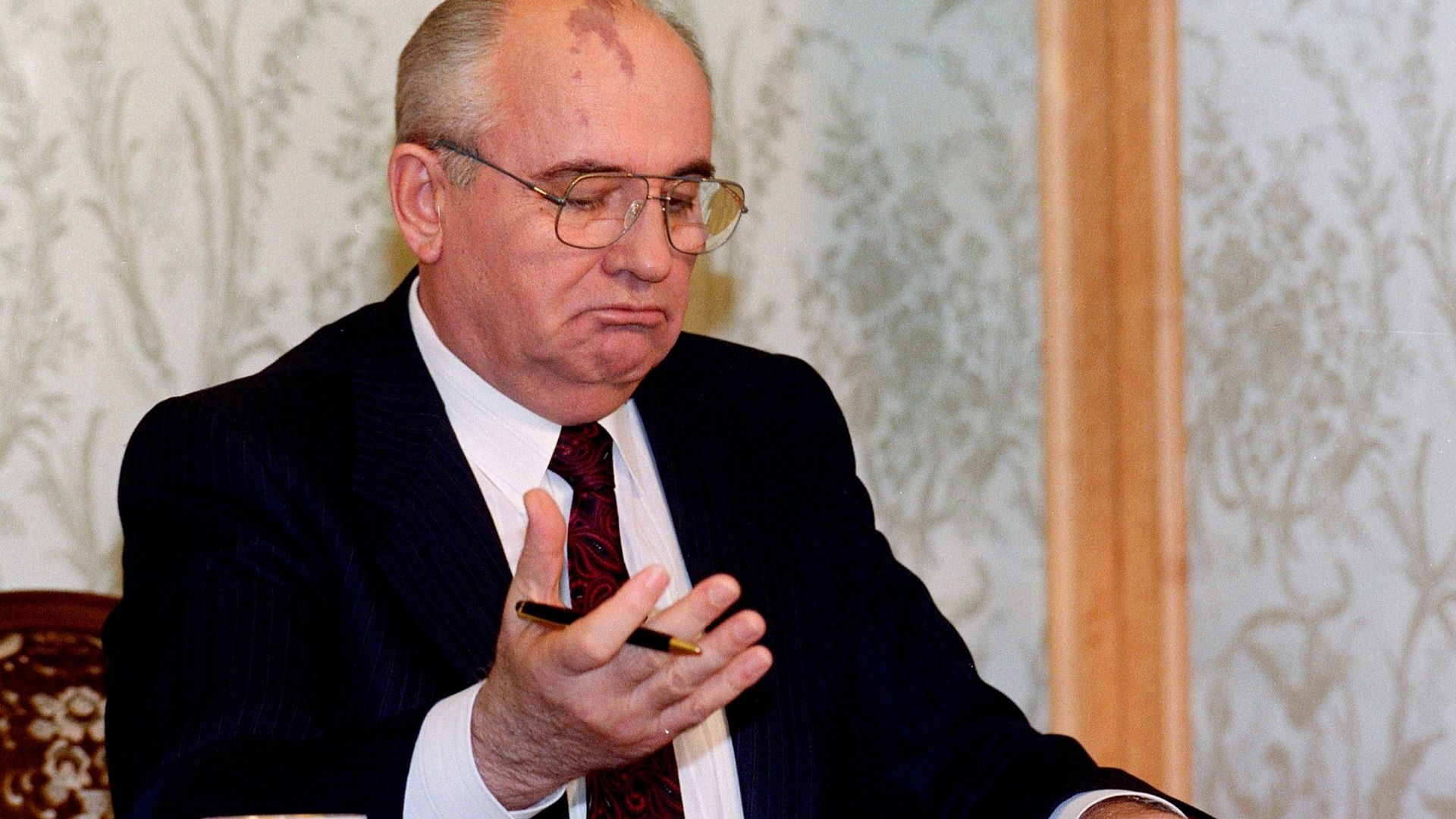

Energetic, persuasive and a good listener, Gorbachev owed his swift promotion to Yuri Andropov, head of the KGB, who became his most important patron. Andropov saw his protégé as a loyal communist who would rejuvenate the leadership and clean up the system. When still under 40, he became party leader in Stavropol and in 1978 was summoned to Moscow; made agriculture secretary in the central committee, he was promoted to the Politburo two years later.
戈尔巴乔夫精力充沛,善于说服别人,善于倾听,他的迅速晋升要归功于克格勃首脑尤里•安德罗波夫(Yuri Andropov),后者是他最重要的赞助人。安德罗波夫将自己的门徒视为一个忠诚的共产主义者,将重振领导层,清理体制。不到40岁时,他成为斯塔夫罗波尔的党魁,并于1978年被召至莫斯科,进入中央委员会农业秘书处,两年后进入中央政治局。
When Andropov succeeded Leonid Brezhnev as party leader in 1982 he appeared to be grooming Gorbachev as his successor. But he died and his protégé’s path to the leadership was blocked by Konstantin Chernenko, a Brezhnev loyalist determined to reverse the reform process.
当安德罗波夫1982年接替列奥尼德•勃列日涅夫成为党的领导人时,他似乎在培养戈尔巴乔夫成为他的继任者。但他去世后,其门徒通往领导层的道路被康斯坦丁·契尔年科(Konstantin Chernenko)阻断了。契尔年科是勃列日涅夫的忠实拥护者,决心逆转改革进程。
In the meantime, Gorbachev had met by chance the man who became his most important intellectual inspiration for reform: Alexander Yakovlev, a former head of the party’s ideology department.
与此同时,戈尔巴乔夫偶然遇到了一个人,这个人成为他最重要的改革思想灵感来源:亚历山大·雅科夫列夫(Alexander Yakovlev),党的意识形态部的前部长。
They met in 1983 when Gorbachev was on an official visit to Canada to inspect farm facilities. Stranded for hours while awaiting the arrival of Ottawa’s farm minister, they took a “walk that changed the world” and discovered that they shared almost identical ideas. Three weeks later, Gorbachev persuaded Andropov to bring Yakovlev, the Soviet ambassador to Canada, back to Moscow.
他们在1983年相遇,当时戈尔巴乔夫正在对加拿大进行正式访问,视察农场设施。在等待渥太华农业部长到来的几个小时里,他们进行了一次“改变世界的散步”,发现他们的想法几乎完全相同。三周后,戈尔巴乔夫说服安德罗波夫把苏联驻加拿大大使雅科夫列夫调回莫斯科。
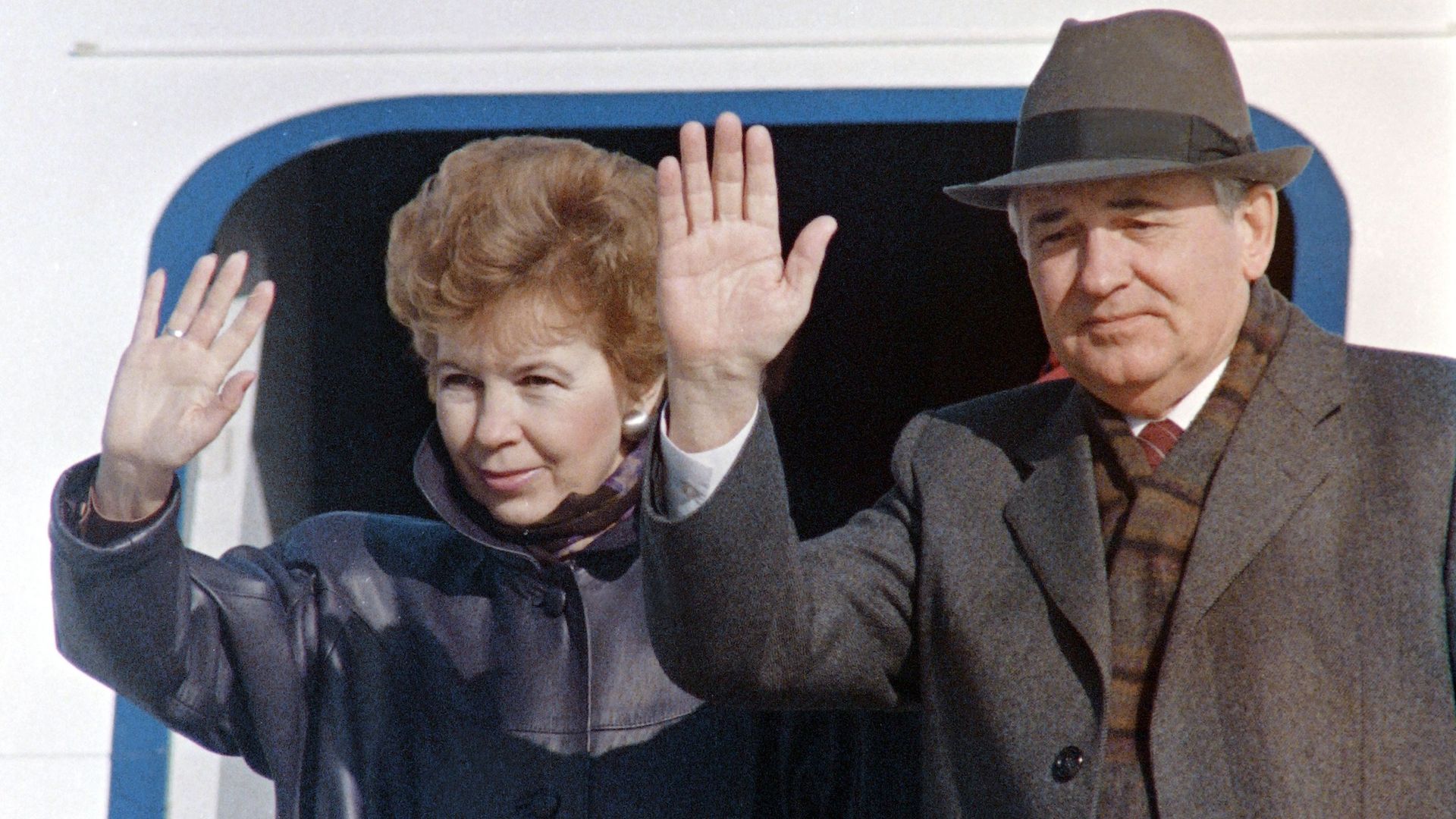

His other key ally was Eduard Shevardnadze, former party leader in Georgia, who became his inspired choice as foreign minister in 1985 — his trusted envoy throughout the process of detente and confidence-building that ended the cold war.
他的另一个重要盟友是格鲁吉亚前党领袖谢瓦尔德纳泽。1985年,谢瓦尔德纳泽成为他鼓舞人心的外交部长人选。在结束冷战的缓和和建立信任的整个过程中,谢瓦尔德纳泽一直是他信任的使者。
It was Yeltsin’s instinct to back the opposition that proved the most prescient and it was Gorbachev’s hesitation to break from his party that destroyed him. Its banning after the 1991 coup removed Gorbachev’s power base. He never forgave Yeltsin for his disloyalty.
事实证明,叶利钦支持反对派的本能是最有先见之明的,而戈尔巴乔夫对脱离其政党的犹豫不决毁了他。1991年政变后,该党被取缔,戈尔巴乔夫的权力基础被清除。他从未原谅过叶利钦的不忠行为。
The death of Raisa in 1996 then left Gorbachev devastated. Asked once what he discussed with his wife, he had replied with one word: “Everything.”
1996年赖莎的去世让戈尔巴乔夫一蹶不振。有一次被问及他与妻子讨论什么,他只回答了一个词:“一切”。